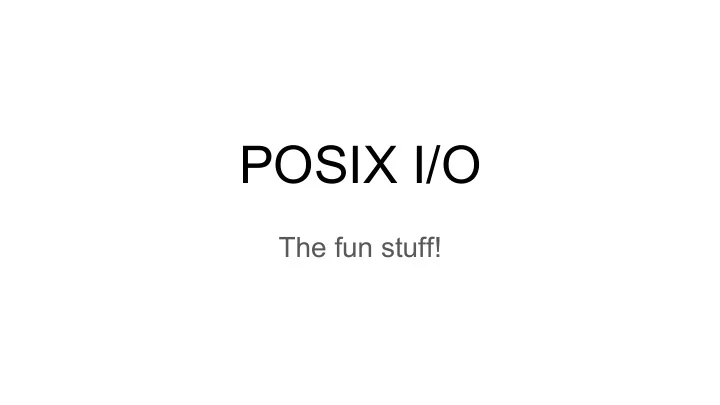

POSIX I/O The fun stuff!
Review from Lecture ssize_t read(int fd, void *buf, size_t count) result = -1 An error occurred errno = error result = 0 Already at EOF result < count Partial Read result == count Success!
New Scenario - Messy Roommate ● The Linux kernel is now your roommate ● There are N pieces of trash in the room There is a single trash can, char bin[N] ● ○ (For some reason, the trash goes in a particular order) ● You can tell your roommate to pick it up, but he/she is unreliable
New Scenario - Messy Roommate NumTrash pickup(roomNum, trashCan, Amount) NumTrash == -1 “ I tried to start cleaning, but something came up ” errno == excuse (got hungry, had a midterm, room was locked, etc.) NumTrash == 0 “ You told me to pick up trash, but the room was already clean ” NumTrash < Amount “ I picked up some of it, but then I got distracted by my favorite show on Netflix ” NumTrash == Amount “ I did it! I picked up all the trash! ”
NumTrash pickup(roomNum, trashCan, Amount) How do we get the room NumTrash == -1, errno == excuse clean? NumTrash == 0 NumTrash < Amount NumTrash == Amount ● Use a loop. What’s the (high level) goal? ○ Pick up all N pieces of trash ● What if the roommate returns -1 with an excuse? ○ If it’s a valid excuse, stop telling them to pick up trash That’s it! ○ If it’s not, start over at the top of the loop ● What if the room is already clean? ○ Stop telling the roommate to pick up trash ● What if the roommate only picked up some of it? ○ Record how much they picked up, and tell them to pick up the rest ● What if the roommate picked up everything you asked? ○ Our goal has been reached!
NumTrash pickup(roomNum, trashCan, Amount) How do we get the room NumTrash == -1, errno == excuse clean? NumTrash == 0 NumTrash < Amount NumTrash == Amount What do we bin[N-1] do in the following scenarios? bin[0]
NumTrash pickup(roomNum, trashCan, Amount) How do we get the room NumTrash == -1, errno == excuse clean? NumTrash == 0 NumTrash < Amount NumTrash == Amount Decide if the bin[N-1] excuse is I have to study for cse333! I’ll reasonable, do it later. and either let it be or ask again. bin[0]
NumTrash pickup(roomNum, trashCan, Amount) How do we get the room NumTrash == -1, errno == excuse clean? NumTrash == 0 NumTrash < Amount NumTrash == Amount Stop asking bin[N-1] them to clean The room is already clean, the room! dawg! There’s nothing to do. bin[0]
NumTrash pickup(roomNum, trashCan, Amount) How do we get the room NumTrash == -1, errno == excuse clean? NumTrash == 0 NumTrash < Amount NumTrash == Amount Ask them I picked up 3 bin[N-1] again to pick whole pieces of trash! What more up the rest do you want from me? of it. bin[0]
NumTrash pickup(roomNum, trashCan, Amount) How do we get the room NumTrash == -1, errno == excuse clean? NumTrash == 0 NumTrash < Amount NumTrash == Amount They did bin[N-1] what you I did it! The whole room asked, so is finally clean. stop asking them to pick up trash. bin[0]
NumTrash pickup(roomNum, trashCan, Amount) How do we get the room NumTrash == -1, errno == excuse clean? NumTrash == 0 int pickedUp = 0; NumTrash < Amount while ( ____________ ) { NumTrash == Amount }
NumTrash pickup(roomNum, trashCan, Amount) How do we get the room NumTrash == -1, errno == excuse clean? NumTrash == 0 int pickedUp = 0; NumTrash < Amount while ( pickedUp < N ) { NumTrash == Amount NumTrash = pickup( room, bin + pickedUp, N - pickedUp ) if ( NumTrash == -1 ) { if ( NumTrash == -1 ) { if ( bad excuse ) if ( bad excuse ) if ( excuse not reasonable ) ask again ask again ask again stop asking stop asking and handle the excuse } } if ( NumTrash == 0 ) if ( NumTrash == 0 ) // we over-estimated the trash stop asking stop asking since the room is clean add NumTrash to pickedUp }
NumTrash pickup(roomNum, trashCan, Amount) How do we get the room NumTrash == -1, errno == excuse clean? NumTrash == 0 int pickedUp = 0; NumTrash < Amount while ( pickedUp < N ) { NumTrash == Amount result = pickup( room, bin + pickedUp, N - pickedUp ) if ( NumTrash == -1 ) { if ( result == -1 ) { if ( bad excuse ) if ( bad excuse ) if ( errno == E_BUSY_NETFLIX ) ask again ask again continue; stop asking break; } } if ( NumTrash == 0 ) if ( result == 0 ) stop asking break; pickedUp += result; }
Some Final Notes... We assumed that there were exactly N pieces of trash (N bytes of data that we wanted to read from a file). How can we modify our solution if we don’t know N? (Answer): Keep trying to read(...) until we get 0 back (EOF / clean room) We determine N dynamically by tracking the number of bytes read until this point, and use malloc to allocate more space as we read. There is no one true loop . Tailor your POSIX loops to the specifics of what you need!
Recommend
More recommend